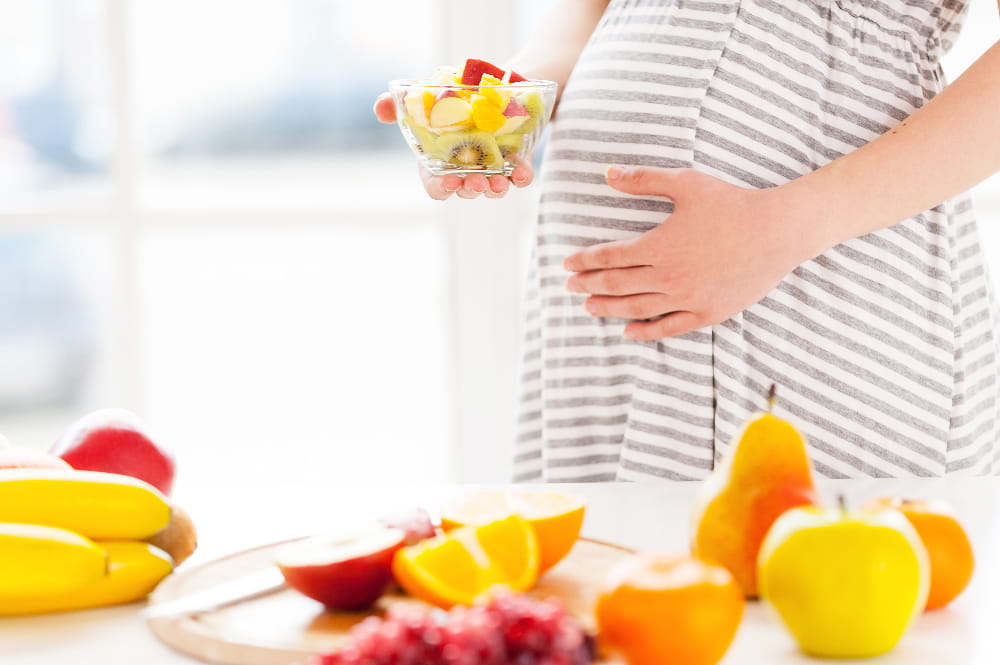
Preparing for A Healthy Pregnancy
The doctors at Vejthani Hospital’s VFC Center understand that achieving pregnancy can sometimes require extra effort and dedication. For those wondering how to get pregnant fast, it’s important to recognize that it often involves more than just understanding one’s physical condition and menstrual cycle. Enhancing your chances of a healthy pregnancy can also be significantly influenced by lifestyle choices.
One effective strategy is incorporating a healthy diet rich in fertility-boosting foods. Consuming a balanced diet that includes nutrients known to enhance fertility can be a great way to kickstart a healthy conception.
Fertility-boosting Foods To Help Women Get Pregnant Faster
While there’s no single magic food that can guarantee pregnancy, integrating specific fertility-boosting foods into your diet can be a proactive step to help a woman get pregnant faster.
We have compiled a list of foods known for their fertility-boosting properties for both men and women. These foods offer essential vitamins, minerals, and other nutrients that can improve your chances of conceiving.
- Sunflower Seed Kernels: Rich in vitamin E, an essential nutrient known for boosting sperm count and motility. They can be easily added to smoothies or sprinkled on salads for a nutritious boost.
- Citrus Fruits: Oranges, pomelos, and grapefruits are rich in polyamine putrescine, which has been linked to improved health of both sperm and eggs, as evidenced by animal studies.
- Mature Cheeses: Varieties like parmesan and aged cheddar are high in polyamines, especially putrescine, which may enhance egg health, particularly in women aged 35 and older.
- Full-fat Dairy Products: Foods like ice cream, cream cheese, and other soft cheeses may help reduce ovulation problems compared to their low-fat counterparts.
- Liver: A powerhouse of highly absorbable iron, which is crucial in preventing miscarriage and maternal anemia, and also a rare source of vitamin A.
- Cooked Tomatoes: Containing almost double the lycopene of raw tomatoes, this powerful antioxidant is known to boost male fertility.
- Beans and Lentils: High in fiber and protein, they also contain folate, which is essential for healthy genetic material and may improve ovulation.
- Berries: Blueberries, strawberries, and raspberries are rich in antioxidants, which help protect eggs and sperm from damage and aging.
- Fatty Fish: Salmon, mackerel, and sardines are excellent sources of omega-3 fatty acids, which are important for maintaining healthy hormone levels and improving egg quality.
- Nuts and Seeds: Particularly walnuts, almonds, and flaxseeds, these are great sources of essential fatty acids and vitamin E, both of which are important for fertility.
- Green Leafy Vegetables: Spinach, kale, and other leafy greens are rich in folate, iron, and calcium, which are vital for creating a healthy environment for pregnancy.
- Whole Grains: Foods like quinoa, brown rice, and whole wheat contain complex carbohydrates that help regulate menstrual cycles and improve ovulation.
Foods to Avoid When Trying to Get Pregnant
When planning for pregnancy, it’s not only important to focus on what you should eat, but also on what you should avoid. Certain foods and substances can negatively impact fertility and should be limited or eliminated from your diet:
- High-mercury Fish: Fish such as shark, swordfish, king mackerel, and tilefish contain high levels of mercury, which can be harmful to your reproductive health. Opt for low-mercury alternatives like salmon, tilapia, or shrimp.
- Trans Fats: Found in fried foods, baked goods, and processed snacks, trans fats can increase the risk of ovulatory infertility. Replace them with healthier fats found in foods like avocados, nuts, and olive oil.
- Unpasteurized Foods: Avoid unpasteurized dairy products and soft cheeses like brie, feta, and blue cheese. These can contain harmful bacteria like Listeria, which can negatively impact pregnancy.
- Excessive Caffeine: While moderate caffeine consumption is generally considered safe, high amounts can be linked to fertility issues. Limit your intake to less than 200-300 milligrams per day, equivalent to about 2 cups of coffee.
- Alcohol: Alcohol can affect both male and female fertility. It’s best to reduce or completely abstain from alcohol when trying to conceive.
- Processed Meats: Studies suggest that consuming processed meats can affect fertility. Choose lean protein sources like chicken, turkey, and fish.
- Soy Products: Excess soy can disrupt hormonal balance for some women, especially those with thyroid issues. Moderation is key.
- Sugar-sweetened Beverages: High sugar intake can lead to insulin resistance, which can interfere with ovulation. Choose water or natural fruit juices instead.
- Refined Grains and Carbohydrates: These can cause spikes in blood sugar and insulin levels, affecting menstrual cycles and ovulation. Opt for whole grains like brown rice and whole wheat bread.
Keep in mind that everyone’s body is unique, and what may be a concern for one person might not be for another. It’s best to consult your doctor to find out which foods are best for you, and always carefully consider any allergies.
Contact VFC Center Today
These are just a few examples of fertility foods for women that can aid in conception when included regularly in your diet while trying to get pregnant. For more comprehensive guidance on conceiving a baby, consider scheduling an appointment at the VFC Center at Vejthani Hospital in Bangkok, Thailand. Our expert team of healthcare providers offers personalized advice tailored to your individual health needs and fertility goals, ensuring you receive the best possible support on your journey to parenthood.

The team of specialists in obstetrics and gynecology and reproductive medicine





No Comments
Sorry, the comment form is closed at this time.